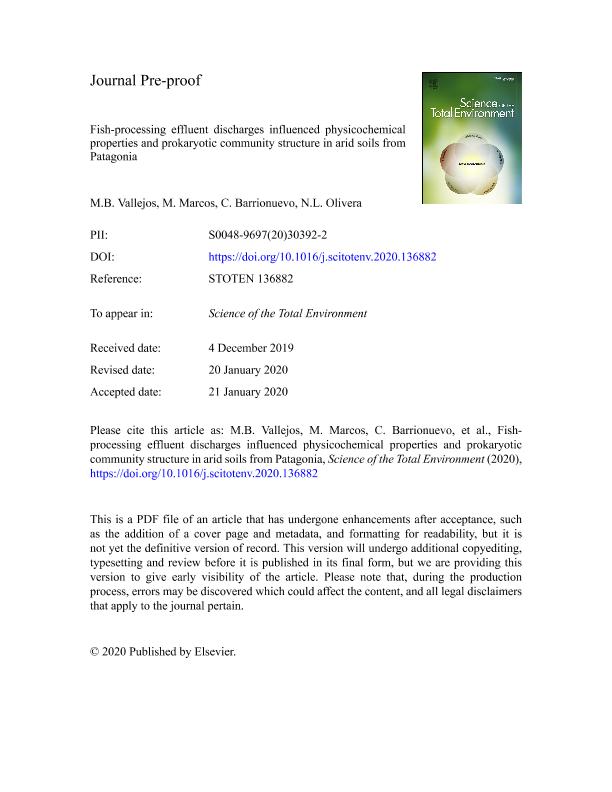Artículo
Fish-processing effluent discharges influenced physicochemical properties and prokaryotic community structure in arid soils from Patagonia
Vallejos, Maria Belen ; Marcos, Magalí Silvina
; Marcos, Magalí Silvina ; Barrionuevo, Cristian Gustavo
; Barrionuevo, Cristian Gustavo ; Olivera, Nelda Lila
; Olivera, Nelda Lila
 ; Marcos, Magalí Silvina
; Marcos, Magalí Silvina ; Barrionuevo, Cristian Gustavo
; Barrionuevo, Cristian Gustavo ; Olivera, Nelda Lila
; Olivera, Nelda Lila
Fecha de publicación:
04/2020
Editorial:
Elsevier
Revista:
Science of the Total Environment
ISSN:
0048-9697
e-ISSN:
1879-1026
Idioma:
Inglés
Tipo de recurso:
Artículo publicado
Clasificación temática:
Resumen
Along the Patagonian coast, there are processing factories of marine products in land that produce fish-processing effluents. The aim of the present study was to assess the physicochemical properties and the prokaryotic community composition of soils receiving fish-processing effluent discharges (effluent site-ES), and to compare them with those of unaltered soils (control site-CS) in the arid Patagonian steppe. We analyzed soil prokaryotic communities (using amplicon-based sequencing of 16S rRNA genes), soil physicochemical properties and fish-processing effluent characteristics. Soil moisture, electrical conductivity (EC), total and inorganic C were significantly higher in ES than in CS (p < .05). Effluent discharges induced a decrease in the total number of operational taxonomic units (OTUs) and in the Shannon diversity index (p = .0009 and .01, respectively) of soil prokaryotic community. Proteobacteria, Actinobacteria and Acidobacteria were the dominant phyla in CS, while ES soil showed a more heterogeneous composition of phyla. Linear discriminant analysis (LDA) effect size (LEfSe) analysis showed that fish-processing effluent discharges promoted an enrichment of Firmicutes and Bacteroidetes, which are active contributors to organic matter mineralization, along with a decrease of oligotrophic phyla such as Acidobacteria, Chloroflexi, Armatimonadetes and Nitrospirae, commonly found in nutrient-poor arid soils. The concentrations of inorganic C and ammonium, the EC and the soil moisture explained 73% of the total variation within the community composition. Due to its salinity and nutrients, fish-processing effluents have potential mainly for native salt-tolerant plant irrigation, however the impacts of soil prokaryotic community shifts over plant growth remain to be determined.
Archivos asociados
Licencia
Identificadores
Colecciones
Articulos(IPEEC)
Articulos de INSTITUTO PATAGONICO PARA EL ESTUDIO DE LOS ECOSISTEMAS CONTINENTALES
Articulos de INSTITUTO PATAGONICO PARA EL ESTUDIO DE LOS ECOSISTEMAS CONTINENTALES
Citación
Vallejos, Maria Belen; Marcos, Magalí Silvina; Barrionuevo, Cristian Gustavo; Olivera, Nelda Lila; Fish-processing effluent discharges influenced physicochemical properties and prokaryotic community structure in arid soils from Patagonia; Elsevier; Science of the Total Environment; 714; 4-2020; 1-9
Compartir
Altmétricas



